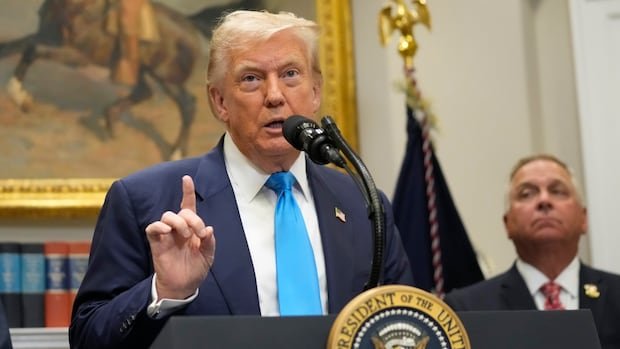Appellate court judges demonstrated significant doubt on Thursday regarding the legal basis behind President Donald Trump’s latest round of tariffs, particularly the recent increase to 35 percent on Canadian imports. The 11-judge panel at the U.S. Court of Appeals for the Federal Circuit in Washington appeared unconvinced by the Trump administration’s argument that the president had the authority to impose tariffs without congressional approval under the International Emergency Economic Powers Act.
During the 99-minute hearing, Brett Shumate, representing the administration, acknowledged that no previous president had interpreted the law in this manner. However, he maintained that the action was within the bounds of legality. The International Emergency Economic Powers Act, signed by President Jimmy Carter in 1977, allows the president to seize assets and block transactions during a national emergency. While the law has been utilized in various global crises, the panel questioned whether it extended to tariffs and whether the imposed tariffs aligned with the perceived threat.
Attorney Neal Katyal, representing the plaintiffs, criticized Trump’s actions as an unprecedented power grab, suggesting that the president was asserting unchecked authority under the guise of an emergency declaration. The case is anticipated to progress to the U.S. Supreme Court regardless of the appellate court’s ruling.
Trump defended his tariff policy on social media, emphasizing the necessity of tariffs for national protection. The administration contends that a national emergency justifies the trade policy, although a previous ruling by a three-judge panel in New York’s U.S. court of international trade ruled against Trump exceeding his authority.
The challenge in court focuses on the Liberation Day tariffs imposed by Trump in April, targeting multiple countries, including separate tariffs on Canada and Mexico. The broader issue of the president’s authority to impose tariffs remains contentious, with multiple lawsuits challenging the administration’s tariff policies. These legal battles underscore the ongoing debate over the balance of power between Congress and the White House on trade policy.
Trump’s aggressive tariff measures have faced criticism, with opponents arguing that these tariffs lead to substantial tax burdens on American consumers. Oregon Attorney General Dan Rayfield expressed confidence following the hearing, suggesting that the judges were skeptical of the administration’s arguments. Rayfield highlighted the significant impact of Trump’s tariffs, characterizing them as one of the most substantial tax hikes in U.S. history, all executed unilaterally by the president.

